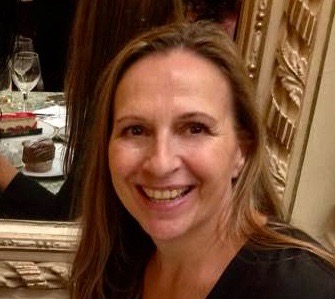EPISODE 10
August 4
Marie-Pierre Nicoletti grew up in a small town in the French Alps, in a bicultural French and Italian family. With a BA in both Applied Foreign Language for International Business in English and Italian, and Italian Language and Civilization, she moved to Paris to attend fashion school. Upon graduating, she worked for the fashion house of Yohji Yamamoto as a trilingual marketing assistant and brand manager. In late 1990, she traveled to the US for a six-month sabbatical in Boulder, Colorado. Eight weeks after arriving, she met her future husband. Ten years later, now a resident of the US and a mother of a young family, she founded the Language of Food, a French culinary, cultural and language program for children and adults. Missing her country and the French lifestyle, she returned to Paris, working in fashion while researching culinary trends. Several years later, she made a permanent move back to Boulder, rebranding and growing her original program into Blossom Bilingual International Preschool, set to open its doors in May 2022.
TRANSCRIPT
Louise: Hello, welcome to Women Who Walk. I’m Louise Ross writer and author of Women Who Walk the book, the inspiration for this podcast. And just as I did for the book here, I’ll be interviewing and unpacking the journeys of impressive, intrepid women, who’ve made multiple international moves for work, for adventure, for love, for freedom. You can find show notes to each episode and my books on my website, LouiseRoss.com.
[00:00:46] Hello listeners. Welcome to Episode 10 of Women Who Walk. My guest today is Marie-Pierre Nicoletti.
[00:00:55] Marie-Pierre grew up in a small town in the French Alps, in a bicultural French and Italian family. She spent the school year in France and the summer months at the family’s house by Lake Maggiore in Northern Italy.
[00:01:09] After graduating college with a BA in both Applied Foreign Language for International Business in English and Italian, and Italian Language and Civilization, she moved to Paris to attend fashion school. Upon graduating, she worked for the fashion house of Yohji Yamamoto as a trilingual marketing assistant and brand manager.
[00:01:32] In late 1990, she traveled to the US for a six-month sabbatical in Boulder, Colorado. Her goal was to return to Paris, fluent in spoken English in preparation to apply to the fashion house of Japanese designer, Issey Miyake. Eight weeks after arriving in Boulder, she met her future husband.
[00:01:54] In December, 2000 now a resident of the US and a mother of a young family, she founded the Language of Food, a culinary and cultural program for children and adults, teaching traditional and regional French cooking and French language to residents of Boulder.
[00:02:12] But in 2004, Marie-Pierre moved back to Paris with her two children. While there she researched culinary trends, developing her expertise in regional foods and specialities while working for a fashion house.
[00:02:27] In 2007, she returned to Boulder and within a year, she’d jump-started her Language of Food as a French-immersion summer camp. A couple of years later, Marie-Pierre evolved her offering to include French After-School, a program where French was taught via arts, cooking and music, as a means of fostering a passion for the French language.
[00:02:51] Working with children, led her to pursue a degree in early childhood education and in 2014, she qualified as an Early Childhood Director. A year later, she opened Blossom Bilingual Preschool in Boulder, a Waldorf-inspired French bilingual preschool, which Marie-Pierre is on track to grow into an international preschool by May, 2022.
[00:03:19] I met Marie-Pierre in the ’90s when I also lived in Boulder and I was impressed back then with her initiative and drive to share her language and culture. Over the years, I watched her go from strength-to-strength, winning the support of parents who came to understand and value what she was teaching their children.
[00:03:39]
[00:03:39]
[00:03:51] Welcome Marie Pierre. And thank you for being a guest on Women Who Walk. It’s good to talk to you after all of these years. And tell me, how are you doing?
[00:04:00] Marie-Pierre: I’m doing very well, Louise. Thank you so much for having me as a guest on your podcast. It’s a pleasure to reconnect with you and we did stay in touch by looking at each other on our social media. And it’s really nice to be here. Thank you.
[00:04:17] Louise: Well, listeners are aware from my introduction that you live in Boulder, in Colorado, but set the scene for us. Tell us a little about your neighborhood, perhaps the view from your windows.
[00:04:29] Marie-Pierre: Yes, I do live in Boulder, in Colorado and it’s a very beautiful place. There’s no doubt about that. And Boulder was just named best place to live in nation by US News and World Report for the second year in a row. We’re very proud of that. We are in the mountains at 1700 meters high. Out my windows, I see lots of mountains. I see the Flatirons, and lots of hiking trails. Definitely a great combination of outdoors, health and sports.
[00:05:06] Louise: It is. I certainly remember it from my days living there and the view of the mountains, the Flatirons is absolutely spectacular.
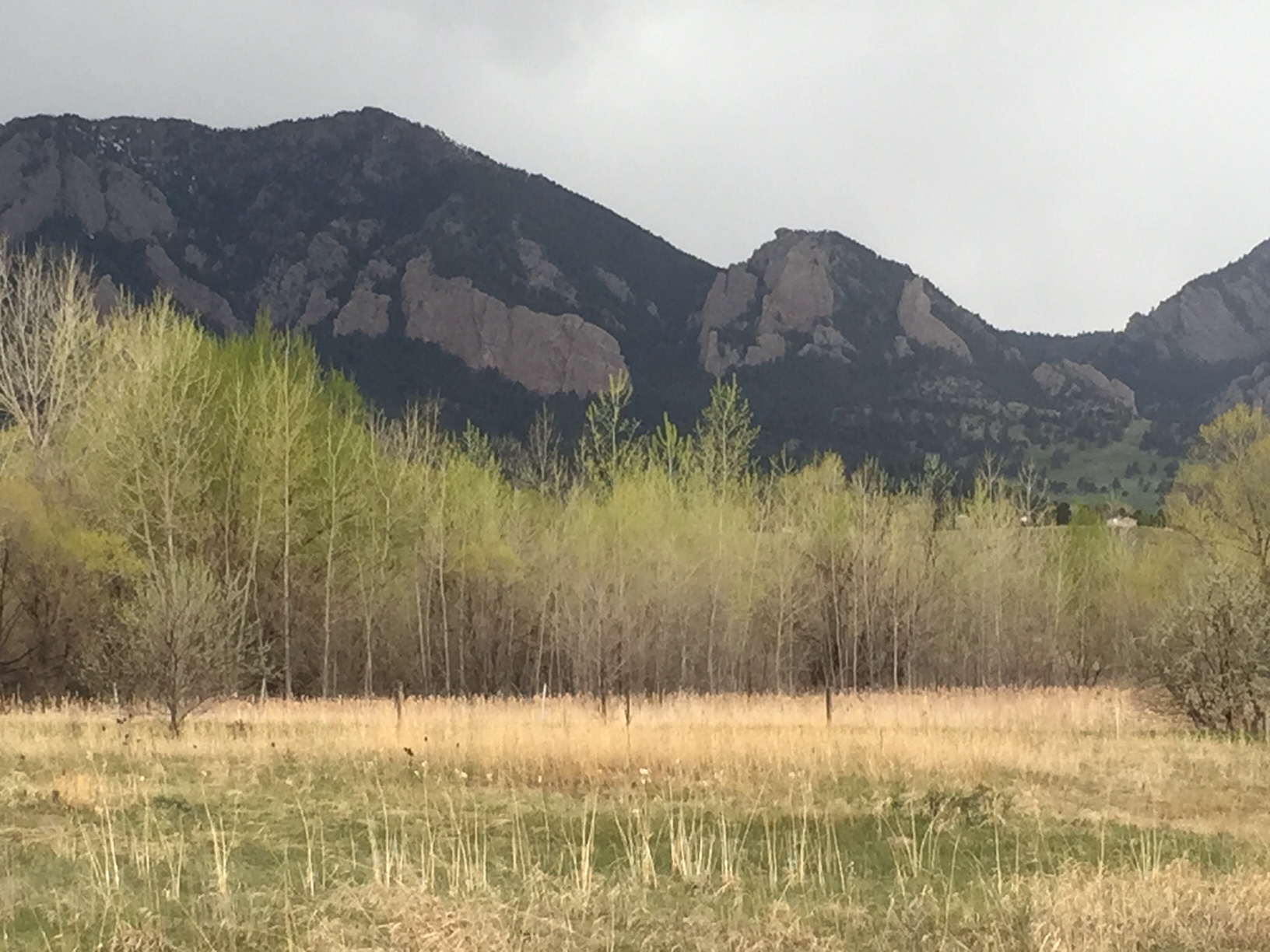
Image by Louise Ross, Rocky Mountain Foothills, South Boulder
[00:05:14] Marie-Pierre: And it’s, it’s a place where you feel like you are on vacation all the time, even though we all work really hard.
[00:05:21] Louise: That’s true. It’s an entrepreneurial community and people seem to be working 24/7.
[00:05:28] Marie-Pierre: That’s correct. Yeah.
[00:05:29] Louise: So now your, your childhood sounds really ideal. You spent the school year in France and summers on Lake Maggiore or in Northern Italy. Can you tell us what you loved most about those days?
[00:05:42] Marie-Pierre: The environment I grew up in is very similar to Boulder. I grew up in the French Alps, and, um, then spent the summer on the other side of the border in the Italian Alps. And I really loved spending summers in Italy. And, um, I love connecting with a different culture and different rhythm, different food. I loved everything about it. I always felt like a fish in water when I was in Italy. And I thought it was brilliant that each year went to the same location in the same house. And, uh, we live the life of the locals and we knew everyone and everyone knew us. I think it’s a really good way to take children on vacation.
[00:06:31] Louise: Was it your father that’s Italian?
[00:06:34] Marie-Pierre: My father is Italian, but from a different region, from Venice, Veneto. My mother is French, but from Italian origins and the house we spent our summers at was, uh, grandfather’s house. It was built in 1500s. And the house is in the courtyard. I actually bought the house next door four years ago because I’m so in love with this courtyard, where as a kid, we played there all day and all night long. I have lots of memories there and I definitely love this area.
[00:07:13] Louise: So that’s really interesting. You bought a house in your childhood summer vacation spot, am I getting that right?
[00:07:22] Marie-Pierre: Yes, I did. Four years ago. These are, uh, courtyard houses. So the next door house was available for sale and I knew it and I loved it already. And, uh, took me a few years to decide to purchase it. But eventually I did and I’m really happy I did that. I always felt like someday I live between America and Europe and this will be a place where I can go and also a place to share my culture and my ancestors with my children as well.
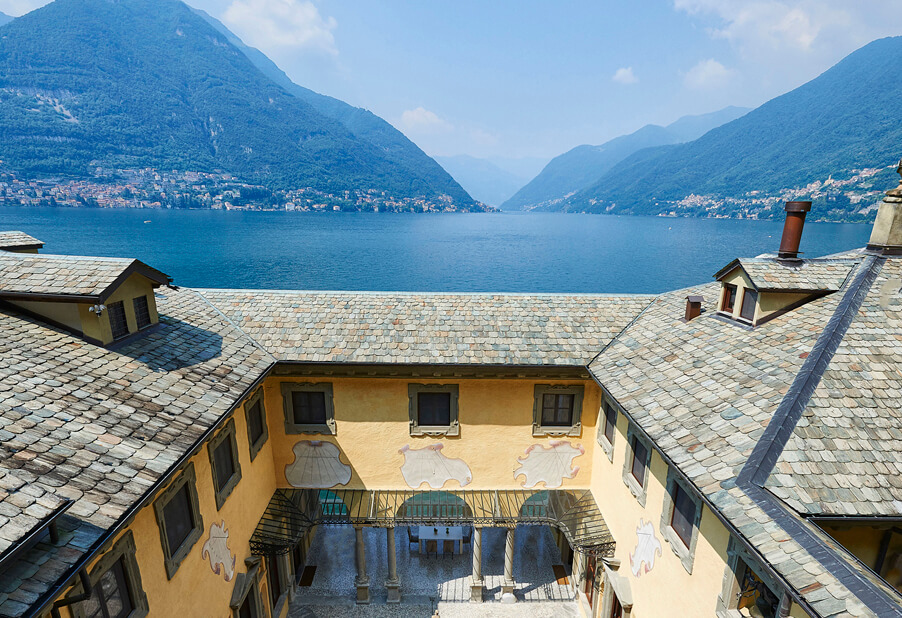
Image by Marie-Pierre, Courtyard house on Lake Maggiore, Northern Italy
[00:08:02 ]Louise: I can imagine that, that was a decision that will enrich your kids’ lives.
[00:08:08] Marie-Pierre: Yes, definitely.
[00:08:11] Louise: You studied languages and international business and fashion. And then you worked in the world of fashion in Paris before taking a sabbatical in Colorado. Now, the Rocky mountain state is quite in contrast to Paris. So why Colorado?
[00:08:27] Marie-Pierre: I actually didn’t choose Colorado as a destination, but, um, Colorado was the only place where I knew someone. I knew I always wanted to go to America. And, um, my roommate in Paris was American and we were doing some sort of exchange between me hosting her in Paris and her, hosting me in America. And by the time I was ready for my sabbatical, she lived in Boulder, Colorado.
[00:09:03] Louise: Well, that makes sense. If that was the one place you had a connection that was the place that you ended up. And then once you’re living in Colorado, you, you meet your partner and you begin to create a life there for yourself, including creating a culinary and cultural program for children. Can you walk us through the early stages of that transition in your career?
[00:09:28] Marie-Pierre: Yes, definitely. At first, landing in Boulder, Colorado was really, really culture shock. It was so different. I felt like I traveled back in time. There was a lot I really liked about it. And then I met my future husband. But there was nothing here for me to do, except one company that was designing children’s clothing. So that’s the company I worked for when I first arrived in Boulder, once I received my work visa, my green card. And, um, it was great. We did everything from designing to garment production, and I actually was writing the technical documentation for the manufacturers.
[00:10:17] So this was ideal for me. Um, I love the location, I loved my work and I loved my new life. For the first few years, I totally embraced my new culture and my new environment. But little by little, I was solicited to teach French by friends or coworkers and I tried teaching French, but I found it difficult to make it very interactive and alive.
[00:10:48] I knew there was a way to make it interesting. And I started thinking about teaching French while my students are doing something more in an integrated curriculum kind of way. And because I had been cooking since I was eight years old the two came together and, um, I created this program where I teach cooking classes while teaching French classes.
[00:11:22] It got quite successful pretty quickly because that’s a concept that did not exist here. So that was great. And I explain the concept to a very good friend of mine and she kind of whispered, oh, it’s like the language of food. And I use this feedback as the name of my company. So I registered my company as the Language of Food and that’s how it was born.
[00:11:52] Louise: I remember those early days actually and thinking what a great initiative that was, that it really blended your skillset so well, and it was the kind of program that was really needed in Boulder, because there, there wasn’t anything like it, it was really, really unique.
[00:12:10] So you’re developing a life and a new career direction for yourself in Boulder. And then your relationship ends and you go back to France and then three years on, you once again leave France to come back to Colorado. How did you make the decision to leave and determine that Boulder would be the place to continue growing your life and your entrepreneurial aspirations?
[00:12:36] Marie-Pierre: Well, while I was developing the Language of Food, it was very clear that I really missed France. After being here for 14 years, I really missed my family, my friends, my lifestyle. So I decided to move back and I thought I was moving back for good. I went right into fashion, worked for new fashion designer and stayed there for three years.
[00:13:09] But I was a little pressured by the father of my children who was in Boulder. So it was a very difficult situation where I felt great in Paris, but their father was here in Boulder. So I went along with everyone’s desire to return to Boulder and having everyone in the same location.
[00:13:39] It was really hard for me to do that. It was not my first choice, but it was basically for my children to never have to say that I kept them away from their father. So then I decided there’s got to be something for me in this trade-off and that’s when I decided I’m going to pursue the Language of Food. I’m going to develop it and it’s going to be what I will be doing and my new baby, so to speak. And that felt really good. That felt really good. Cause it’s definitely much easier to be an entrepreneur in America than it is in France. So I saw the light, the bright light in this transition.
[00:14:29] Louise: Boulder is such an entrepreneurial community, and you recognized that it was going to be easier there for you to set up and run your business than in Paris. Could you tell us why? Why is that the case?
[00:14:43] Marie-Pierre: It’s more difficult in Paris to start anything and to, to come up with an idea and implement it. And the administrative aspect of every project is a little difficult in France. There are way many more steps to, to go through before you, uh, develop something. I feel like in America, you have an idea and to implement this idea and to start your activity, the steps are much shorter and a lot is basically up to you to come up with the work you need to do and, um, and put yourself out there on the market and promote yourself and attract, um, the clients that resonate with your project.
[00:15:39] And Boulder is not a very diverse place, but there is an attraction for diversity. So all things French were very big at the time in the late ’90s, early 2000. So the Language of Food really landing at a good time where there was an attraction for all things French. There was not much, opportunity to learn French, whether for children or for others? I think I really was offering something that was a need.
[00:16:17] Louise: You started something in the right place at the right time. So tell us what were some of the challenges you encountered, introducing your concept of a French culinary language and cultural program in Colorado where the focus and the culture is very much the outdoors and exercise and the mountains and skiing and biking and so on. What were some of the challenges?
[00:16:42] Marie-Pierre: There were a lot of challenges. Basically being a self employed, single mother of two living in a country that is not mine without any real support or the kind of support you get when you are in your own country, your family, your friends, your support system. So I have to say that everything about it was very difficult. But fortunately the population of Boulder and Denver and the surrounding areas is very educated, so if you offer something that is promoting education the population is very receptive.
[00:17:26] In Boulder, there really is a place for outdoor living and there is also a big place for education of all sorts so I fitted very well in the education part. I loved working with children so very quickly the parents talk to each other and promoted my business. But yeah, the challenges were to be on my own and to have to do everything, that’s a big challenge in itself.
[00:17:54] Louise: It also sounds like it built as a result of word of mouth. So in other words, there was support from the parents whose children attended your program.
[00:18:05] Marie-Pierre: Yes. There was a lot of support and a lot of word of mouth, definitely. And I was trying to do everything I did very well because I was very passionate about this project, this business, and I was also discovering that I love teaching my language. I love teaching my culture. I had a love for all things culinary since I was little. All of those aspects together and delivering them to the population, uh, really felt very good. And I can tell now because I’ve moved on to new project, that it was really a good start, of my new life. My second new life in Boulder.
[00:18:53] Louise: And then at one point you came to Lisbon to facilitate a French cooking summer camp. How well was it received here in Portugal compared to say Colorado?
[00:19:04] Marie-Pierre: Yes, that was actually exactly 10 years ago today. I was, I was in Lisbon and I was invited to teach, uh, my French cooking classes in 2011 in French, in a summer program in a place called Galeria Atelier 36, and this is an art gallery that offers a lot of different programs for children and adults, I believe. Um, and the owner of the gallery is actually my aunt and she invited me to come to Lisbon because she offers summer camps for children. I really loved it. And I felt like, oh, I want to do this every summer.
[00:19:55] The children were quite young between five and seven-year old. They were students from the Lycée Français International School so they were fluent in French. My aunt, she actually just retired that year, she had been a teacher there for 45 years. It was a great combination of blending our businesses and our skills. I have a really fond memory of this program. It’s always interesting for me to teach in different cultural settings and observe the children. Each country teaches and treats their children differently. And I love observing that part. It’s a great aspect of my business. Definitely.
[00:20:43] Louise: Though I don’t have kids, I’m very aware that the way that the Portuguese children are raised is very different from in Australia is very different from in the United States. And it sounds like you saw that as well. What sort of differences did you notice?
[00:21:00] Marie-Pierre: There are many differences and I’m not saying one’s better than another, but like the way the children greet adults is different, the way they are able to focus on the subject. The relationship between the adult and the child, uh, is different in each country. I love observing that and I love taking little bits here and there thinking, oh, this is better here or this is better there. But without really judging because, um, I respect each culture and I’m more of an observer than a judge of how things should be done or could be done. So I love being the observer and taking it all in.
[00:21:47] Louise: The beauty of the international life that you’ve created for yourself, between Colorado and Europe, is that you’re able to go back and forth and in 2013, you created a Paris tour for kids, which sounds like that would have been so exciting for the children. Two things come to mind, firstly, it must have been a huge undertaking traveling with a group of children from Colorado to Paris. And secondly, I imagine it was a wonderful experience introducing the kids to the cultural delights of your city.
[00:22:23] Marie-Pierre: Exactly. After the great experience I had in Lisbon, I wanted to continue doing something similar, um, taking my show on the road, so to speak. And, uh, so yes, two years later I created Paris Tour For Kids, and it actually was a huge undertaking and a huge amount of preparation work for the trip.
[00:22:49] I organized everything ahead of time. Each day, each hour, we were going to different places. And this was all set ahead of time. I actually met the Colorado children in Paris. Their parents were traveling to Paris, they either had to work or to do research or vacation in Paris. And most of these children were my students here in Boulder, uh, whether they were students in my cooking schools or in my French After-School program. And, um, so each morning I met the children at 10:00 AM and then the parents would go do what they had to do. And I had this group of, I believe, eight kids and we just were off to a full day of visits and tours and walks and time at the park.
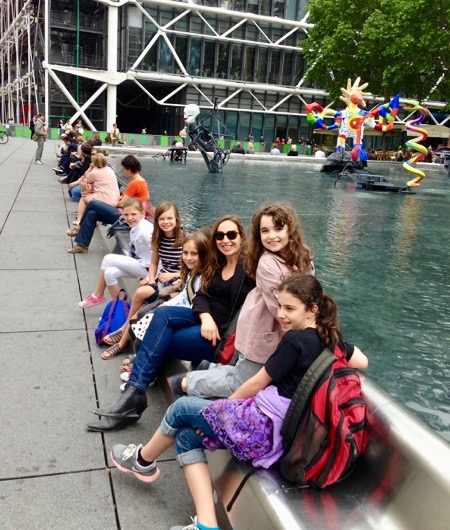
Marie-Pierre with children on the ‘Paris Tour For Kids’
[00:23:46] The Culinary experience was at the heart of this project so each day I took them to a different place, like Ladurée, Angelina, Fauchon, all the big names in Paris culinary field. I really loved doing that. The children were amazing. Everyone had a great time and it was a great experience. I felt like I want to do this every summer. But it was a lot of work. I looked for a partner, a business partner to, to tag along and do this together and never found one. So the following year, I limited my summer program to, to my local French summer camp.
[00:24:31] Louise: Yes, it sounds huge. But such a fabulous and exciting time for the children.
[00:24:38] Marie-Pierre: Yes, definitely. Definitely. And because I know Paris so well, I could take them to places and I could also tailor my, um, visits to what they liked. It was great. It was great for me too.
[00:24:52] Louise: So over the years, you really evolved your skill, your talent, your offering, as a language and culture Preschool teacher and then I understand that this led you to a new project, which required, I believe, that you return to school to qualify as an Early Childhood Director. Was this a requirement for you to open and run your next project?
[00:25:20] Marie-Pierre: Yes, it was a licensing requirement. Very early on, when my son was two-years old and I was looking for a preschool, I was a little frustrated that there was no, um, French bilingual program in Boulder. Because I knew a lot of French people with little children and I felt like, this would do well so I always had in the back of my mind that since there is none, I should start one.
[00:25:49] And, uh, it was a licensing requirement. Um, I needed a dozen of, uh, early childhood classes to become director qualified. And so very naturally I just went back to college and I was 50 years old. And I went for two full years. I did three semesters each year. I was still a single mother and I was still teaching, making a living and I was still raising my two children. And, uh, so it was so much work. Uh, I wouldn’t change any of it. I loved it. I had to cut myself off any other life. Um, could not see any friends. Could not go to any dinner, could not go out for two years. I could only focus on earning a living, going to school and raising my children. That’s all I could do. Realizing that I had to push my limits on so many levels, uh, was a very meaningful experience.
[00:26:54] Louise: So then once you get your Early Childhood Director certification, this next project is the Blossom Bilingual Preschool. And I believe that’s due to open next year?
[00:27:08] Marie-Pierre: Well, I opened Blossom Bilingual Preschool seven years ago, actually. And I’ve been running the school for entering my seventh year. And I am working on a new project called Blossom International Preschool and this is due to open May, 2022.
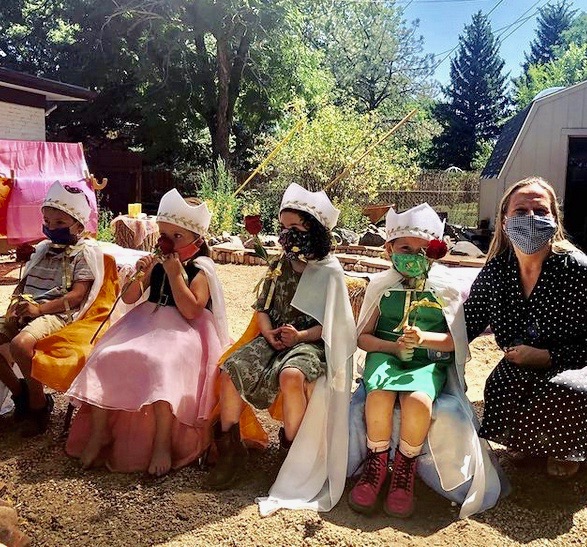
Marie-Pierre and Blossom Bilingual Preschool children
[00:27:33 ]Louise: I see.
[00:27:34] Marie-Pierre: And the reason why I’m going from French bilingual to international is that I have observed this past seven years, that my school attracts a lot of international families. And, I felt like in attracting these families, I should have a international hub where we honor and, um, celebrate all cultures instead of just French culture. It’s how the original French bilingual preschool is evolving to French international preschool.
[00:28:09] Louise: That’s a wonderful vision. I love that. It was actually going to be my next question. What’s the vision for the school, but perhaps you can tell me a little bit more and, and then perhaps where you see yourself with the school in say five, 10-years time.
[00:28:25] Marie-Pierre: So the vision for the school is really to have an international hub in Boulder that starts very young, but I would like to continue offering preschool, but at the same time, continue offering French classes for older children and maybe other languages classes. And I would like to go back to offering French cooking classes. I really miss doing that. So a place where languages and cultures can meet and mingle and be celebrated. And I hope in five years from now, it’s a well-established location that I can still be a part of.
[00:29:12] Somewhere inside of me, there is a desire to start spending part of my year in Boulder, Colorado, and part of my year in Europe. And so I’m working toward this goal. I’m often asked, are you, are you going back to Europe eventually? I always say I have one foot in each country. So I’m hoping to be able to split my time between America and Europe.
[00:29:45] Louise: That makes sense, given that you bought the home in your childhood summer vacation spot, it sounds like that would be a beautiful place to return to. So as we finish up Marie-Pierre, are you comfortable sharing your website, perhaps your social media?
[00:30:01] Marie-Pierre: Of course, actually we have a new website. That is, um, already introducing our next school and it’s BlossomInternationalPreschool.com and from our website, you can find the links to all the other social media platforms that we are on.
[00:30:27] Terrific. Thank you. And I’ll include a link in the transcript to this episode, so that should listeners like to just link through, they can go to my website, LouiseRoss.com under Marie-Pierre’s episode and click through. Well, thank you so much for your time today, Marie-Pierre, this has been a wonderful journey through the evolution of your entrepreneurial adventures from Paris to Colorado, and then back to Europe. And I just wish you the best of luck. Thank you so much.
[00:30:58] Thank you, Louise. It’s been really fun being part of your podcast and thank you for having me. And it’s great to see you and talk to you again. Thank you.
[00:31:10] Louise: Thank you for listening today. And if you would like to read a transcript of this episode, you can find it in the show notes on my website, LouiseRoss.com. And if you enjoyed this episode, please rate and review Women Who Walk on Apple Podcasts or Podchaser.

